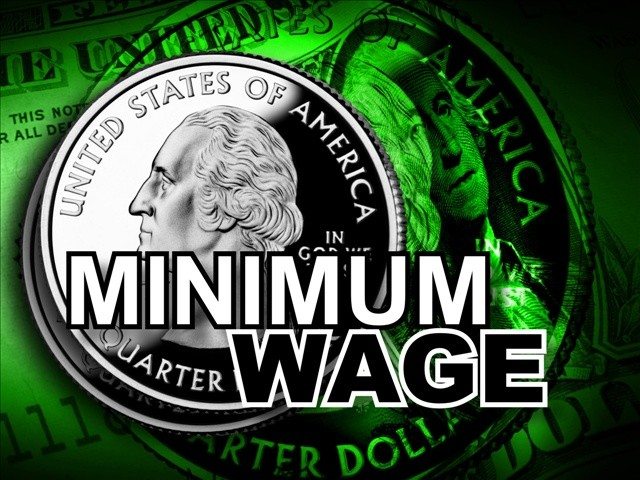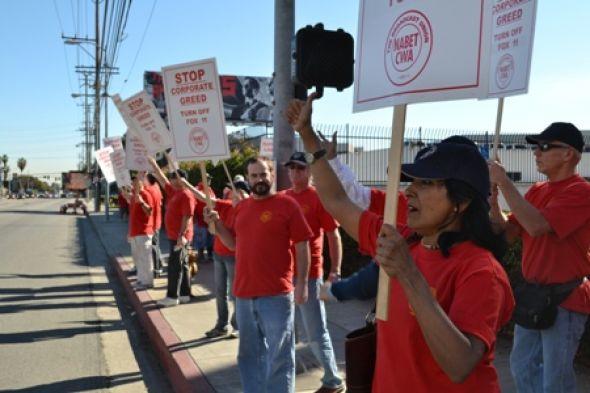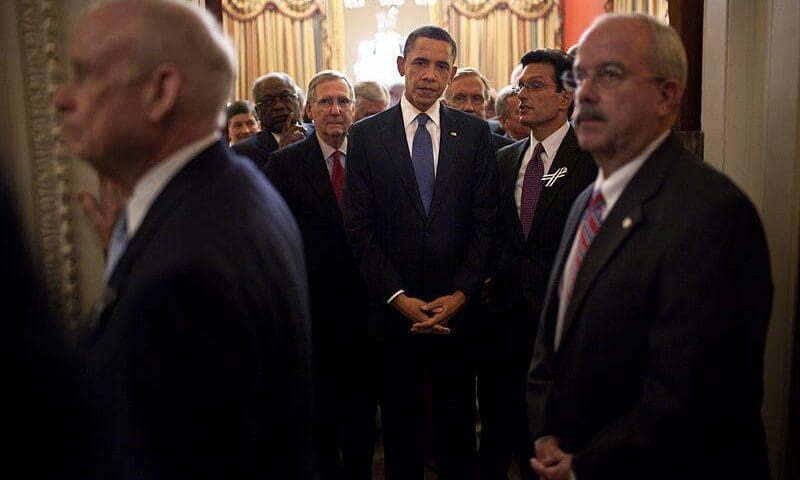

We are workers who move Walmart merchandise at a private warehouse in Chino, California. Just a couple of weeks ago the state of California ordered the warehouse owner to repay us more than $1 million in stolen wages. The California Labor Commissioner determined the warehouse operator, Quetico LLC, had shorted our paychecks and those of more than 800 workers.
Para leer en Español haz cliq aquí.
We are so happy that justice has been served, but we continue to risk our jobs just because we blew the whistle. The company is denying it did anything wrong and appealing the state’s ruling. In the meantime we are worried about retaliation and losing our jobs. We don’t know if we will be fired. Walmart has done nothing.
You can help us. Sign our petition to Walmart.
» Read more about: Petition: Walmart-Contract Workers Fear Retaliation »


My friend pastors a vibrant congregation in the Mid-City area of Los Angeles. Her people reflect the neighborhood and the church worships in both Spanish and English. In a conversation this week I asked her how her folks were doing. Her voice dropped, and she shook her head. “There are no jobs,” she said, “and the ones who work can only get part-time hours.” With dismay, she said, “I don’t know how they are making it.”
I don’t either. At one extreme, high-end properties – homes that sell for several millions of dollars – had a banner year in 2012. Sales of super-expensive automobiles reached record levels. Exotic vacation destinations are packed. The number of jobs in Los Angeles County has reached about 4.3 million, almost the number we had before the Great Recession began five years ago, although there are now also more people looking for work than then.
» Read more about: Of Biblical Proportions: Inequality and Poverty Wages »


Most of us know how badly Walmart treats its employees. Yet whenever the remedy of paying a living wage is proposed, opponents always argue that the cost to Walmart shoppers is too high, and that low-income consumers will be hurt the most.[1]The question is: What will a living wage for Walmart workers cost Walmart shoppers?
First, some background. A 2005 study found that Walmart jobs in metropolitan areas pay less and are less likely to offer benefits. Other researchers demonstrated that Walmart workers earn on average 31 percent less than workers in large retail stores as a whole and about 60 percent of the wages of unionized workers. They also found that an astounding 75 percent of full-time workers with at least one year on the job made below $10 an hour and less than half were enrolled in Walmart’s cost-prohibitive health plan.
Moreover,
» Read more about: Walmart: The Low Cost of High Road Retailers »


Since May of 2011, the producers, editors, photographers and other NABET-CWA* workers at KTTV and KCOP-TV in Los Angeles have been trying to negotiate a fair and reasonable contract with the owner of the stations, Fox Television – but the company has something else in mind.
Fox wants to end the standard 40-hour work week by putting NABET members on a seven-and-a-half-hour work day, and the management also wants to eliminate the paid meal period — which has been an industry standard for decades. Cutting back employees to a 37.5 hour work week effectively amounts to a 6.25 percent wage cut.
It doesn’t end there.
Fox also wants to cut vacation days, sick days, holidays and meal penalties. Premium pay for daily employees would be drastically reduced. Put it all together and many employees would see their wages and benefits reduced by 10 to 20 percent!
» Read more about: Fox: Gouge KTTV and KCOP Workers of Hours and Benefits »


Well… my 68 year old brain has done it again. It’s bad enough going into a room and wondering why you’re in there, but leaving your wallet on top of your car at the gas station, and then driving off, has much more serious consequences. It’s being pre-occupied with multi-tasking in this jet-set age that has overloaded the wiring upstairs. The New York Times had an article that creative acts need a singular focus; you can’t answer the phone, eat lunch, or text while playing music or painting. So I don’t know where my mind was after I set the billfold on the roof, pumped petrol, and left.
Certainly the miracle woman who was driving by later was in her present mind. That afternoon I was in a complete panic, going back to the gas station, looking everywhere, asking the attendant if anything had been turned in…


 Two potential candidates for president in 2016, New Jersey Governor Chris Christie and New York Governor Andrew Cuomo, have taken opposing positions on raising the minimum wage in their states. The debate between the two governors draws a sharp distinction between competing economic visions: trickle-down vs. middle-out economics. At the same time, it also shows how limited the current debate is when it comes to dealing with what’s needed to meet the needs of working families and, in doing so, change the direction of economic policy.
Two potential candidates for president in 2016, New Jersey Governor Chris Christie and New York Governor Andrew Cuomo, have taken opposing positions on raising the minimum wage in their states. The debate between the two governors draws a sharp distinction between competing economic visions: trickle-down vs. middle-out economics. At the same time, it also shows how limited the current debate is when it comes to dealing with what’s needed to meet the needs of working families and, in doing so, change the direction of economic policy.
In late January, New Jersey Governor Chris Christie vetoed a small increase in the minimum wage, from the current federal minimum of $7.25 an hour to $8.50 an hour. Christie said that raising the minimum wage would “jeopardize New Jersey’s economic progress.” Christie based his opposition on concerns about small business, although two out of three low-wage workers are employed by corporations with over 100 employees.


 One of the most exciting and inspirational aspects of coalition building is seeing the success and victories that people get when they come together for the common good of their community. The time and effort that can go into the work is nothing compared to the feeling of victory once the campaign has been won, and the people and community feel the victory themselves.
One of the most exciting and inspirational aspects of coalition building is seeing the success and victories that people get when they come together for the common good of their community. The time and effort that can go into the work is nothing compared to the feeling of victory once the campaign has been won, and the people and community feel the victory themselves.
Unfortunately, groups that have never worked together are often times unwilling to do so because of longstanding suspicions or differences, so building coalitions around economic enhancement projects, political campaigns, religious events and community change is a very hard thing to do. However if you apply some strategy rules to the process you can build a great coalition.
First, you have to believe in what you are trying to build together – and also believe that it can be built. You can’t waste time fighting a cause that is not winnable.
» Read more about: The Art of Coalitions: Building Teams of Rivals, Not Enemies »


More than 30,000 Los Angeles County homes still face foreclosure threats or have already been seized by banks as their owners struggle to cope with more than $14 billion in mortgage debt, a new analysis by Good Jobs LA reveals. These homes include:
The recent news reports about an “easing” foreclosure crisis bring no comfort to the more than 30,000 L.A. County families facing underwater mortgages held by the same banking giants that did so much to crash our economy nearly five years ago.
And the same big banks that led us into crisis continue to top the foreclosure lists,
» Read more about: Foreclosing Time: L.A. County’s Mortgage Crisis Continues »


If you’re sitting in the well of the House when a president gives a State of the Union address (as I’ve had the privilege of doing five times), the hardest part is on the knees. You’re required to stand and applaud every applause line, which means, if you’re in the cabinet or an elected official of the president’s party, an extraordinary amount of standing and sitting.
But for a president himself, the State of the Union provides a unique opportunity to focus the entire nation’s attention on the central issue you want the nation to help you take action on.
President Obama has been focusing his (and therefore America’s) attention on immigration, guns, and the environment. All are important. But in my view none of these should be the central theme of his address Tuesday evening.
His focus should be on the joblessness, falling real wages, economic insecurity, and widening inequality that continue to dog the nation.


Several years ago, I spent time in a rural area of Ghana, a few miles outside the bustling city of Kumasi. As part of a public health research team, I was studying childhood diseases that come from lack of clean water. My goal was to understand how parents made decisions about how to treat their children’s water-related illnesses. Yet while treatment is critical, I was struck most by our relative powerlessness to prevent these diseases from happening in the first place.
More people die from unsafe water than from all forms of violence, including war, according to U.N. Secretary-General Ban Ki-moon. Across the globe from Ghana, here in the United States, we are fortunate to have some of the best public water systems in the world. In the U.S., public water has a long history of prompting economic development and advancing leaps in public health and safety.
Unfortunately our public water systems are under threat.